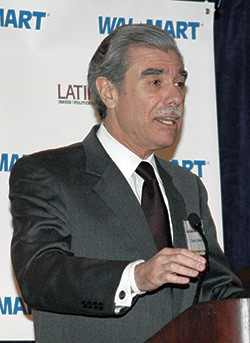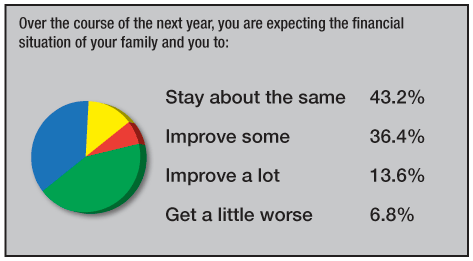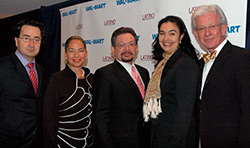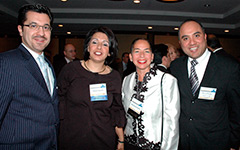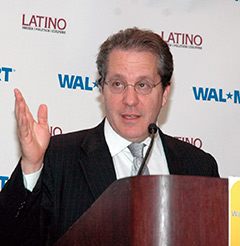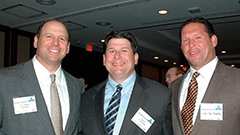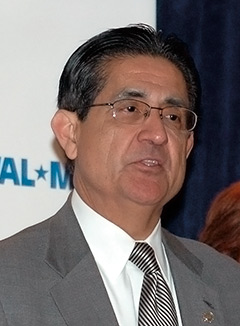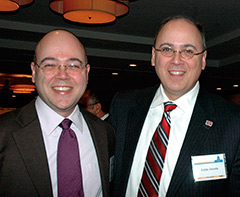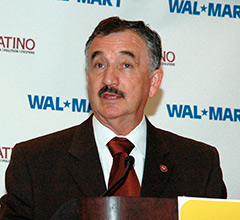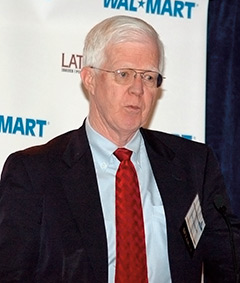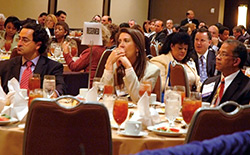
 While our present economic crisis is severely impacting the Latino business community, it is also creating unique opportunities. Latino entrepreneurs are among the hardest hit by falling demand and lack of credit, but they are well positioned to take advantages of systemic changes in the economy.
While our present economic crisis is severely impacting the Latino business community, it is also creating unique opportunities. Latino entrepreneurs are among the hardest hit by falling demand and lack of credit, but they are well positioned to take advantages of systemic changes in the economy.
These were among the findings of the first-ever Latino Economic Summit, which took place March 31, 2009 in Washington, D.C.. Presented by Wal-Mart, LATINO Magazine and Impacto, the event brought together nearly 200 Latino entrepreneurs, influentials, and community leaders at the Hyatt Regency Washington on Capitol Hill to explore how today’s economic challenges affect Latino-owned businesses.
They were welcomed by Esther Silver-Parker, Wal-Mart’s Senior Vice President of Corporate Affairs, who said: “We come together in the grip of what is called in this economy the ‘Hurricane Katrina’ of recessions. One concern unites us all: How will this economic downturn affect the progress made by Hispanics? That progress has been hard-won and it has been spectacular. We cannot let that progress derail.”
The depth of the recession was revealed by the Keynote Speaker, Gene Sperling, an economic advisor to President Clinton and current Counselor to Secretary of the Treasury Timothy Geithner.“These are difficult times,” he said somberly. Sperling recalled the prosperity and “shared economic growth” of the 1990s, and affirmed that was the goal of the Obama Administration. But what made this crisis unique, he said, was the combination of weak demand and a shaky credit system. In the past, a decline in real estate values often led to lower interest rates and a gradual economic recovery. But now, the credit crunch has created a “negative logic” leading to a vicious downward spiral.
Despite the economic crisis, America is experiencing a “Latino Boom.” By 2050, the Latino population in the U.S. is expected to triple. And by 2010, there will be 3.2 million Latino-owned businesses generating $465 billion in annual revenues. It is interesting to note that participants in the Summit remained optimistic. According to a survey taken during the event, 54.5% rated our country’s economic condition “poor.” Yet despite this, 56.8% agreed that things “are headed in the right direction.” (See below for survey findings.)
This attitude was exemplified by the Summit’s Guest of Honor, Aida Alvarez. She became the first Latina member of the Cabinet when she was appointed Administrator of the Small Business Administration in 1997. She affirmed: “I’m very optimistic that as challenging as this economic crisis is, together we have the resources, the talent and the spirit of cooperation to turn this moment into a time of even greater opportunity.”
Leaders Speak Out
Recently, the voices of our nation’s top Latino Business Leaders were heard. Their viewpoints are summarized in the six-page survey captured at the 2009 Latino Economic Summit in Washington, D.C. hosted by Wal-Mart.
Topping the list of key issues for this prominent Latino business group were (1) gaining access to credit and (2) stabilizing financial markets. In contrast, other important issues such as unemployment and declining real estate values ranked significantly lower, a clear aberration to the media’s claim that Latinos have been the segment of the population most affected by the financial crisis, in particular from rising unemployment and increased foreclosures. Based upon these survey results, can it be that Latino Business Leaders are weathering the economic malaise better than expected? Or is the survey data telling us a different story?
Perhaps it is of little surprise that this group of 200 Latino Business Leaders have not lost their homes or their jobs and therefore responded similarly to the way non-Latino Business Leaders also referred to as the “General Market”. The survey data shows that the majority of the Latino Business Leaders and the General Market held similar sentiments about the financial crisis. For example, when asked about what Latino Business Leaders are doing differently to adjust to the financial crisis, the majority of the survey respondents did what the General Market has been saying all along, such as changing the way they invest their savings, limiting their vacations, and eliminating restaurant visits. Perhaps a closer look at the survey data can unveil some insightful clues and further explain these different views.
The profile of the Latino Business Leader includes individuals that own and operate more than one business. They are for the most part entrepreneurs in search of growing opportunities. Many have been raised in a family-owned business environment where cash flow issues, scarcity of inventory, and banking failures were commonplace. The current financial crisis may actually remind them of a personal hardship, one that may have helped form or influence their business acumen. So, it should be to no surprise that Hispanic and non-Hispanic business leaders agree on the measures to be taken to weather a financial crisis. A closer look at the survey data suggests that their opinions begin to differ when asked to share their projections and intentions for the foreseeable future.
The General Market (including their business leaders) have painted gloomy prospects well into 2010, agreeing that 2009 is essentially a wash. On the other hand, the 200 Latino Business Leaders surveyed agreed that 2009 is proving to be a bad year but personally and professionally view 2010 as a year filled with opportunities and promise. In fact 94% of the respondents felt that they would do better next year when compared to this year (see Crisis is Opportunity.)
Latino Business Leader optimism does come with some warning signals that President Obama’s economic advisory team should take into consideration.
The majority of the Latino Business Leader respondents fully support President Obama’s Economic Recovery Plan. However, they lack a clear understanding of the Plan and therefore may not be in a position to buy into the Plan. Since these Latino Business Leaders represent a segment of the population which today is over 45 million and will more than double by 2050, President Obama should ensure that Latino Business Leaders have an integral role in the Plan. So far, Latino involvement in determining the allocation of TARP funds remains scant at best. On the surface, the Plan shines bright with plenty of billions to go around, but as the survey indicates, most Latino Business Leaders remain unconvinced. One Latino Business Leader expressed, “I called the toll-free information lines setup to help small businesses participate in the Recovery Program. After being transferred to over 20 different operators and departments, I gave up.”
The warning signal is clear. If Obama’s Economic Recovery Plan is about putting America back to work by creating new jobs, then helping Latino Business Leaders to be participants will be crucial to its success. Some efforts have already been made to push the “inclusion” agenda among minority groups, but unless the Latino contingent is properly represented, the results may never reach their intended goals. For Obama’s team to get it right, they should provide Latino Business Leaders with greater access to TARP funds, and make it more “user friendly.” Not only will President Obama benefit from the breadth of experience and valuable perspectives offered from a culturally diverse group of Latino Business Leaders, he will also be able to tap into their inherent optimism to succeed in 2010.
Tom Kadala
Crisis is Opportunity
The 2009 Latino Economic Summit, recently held in Washington, D.C., had as its theme Crisis or Opportunity? The objective was to answer the question: Is there opportunity in today’s economic crisis? If there is, where is it and how can Latino-owned businesses leverage it? Many well-known and respected Latino Business Leaders took the stage and addressed this very question in their remarks. After the inspiring and interactive dialogue, the 200 attendees, which represented the full spectrum of the U.S. Latino business community, had the opportunity to also share their views to this very question with an in depth, six page survey.
The findings will now provide our country’s leadership the first-ever qualitative perspective on the collective economic outlook of the private and public sectors, as well as the leadership of the top Latino community organizations.
Both the speakers and the Latino VIP attendees gave a somber outlook for our country’s current situation, as well as immediate future---yet both shared the same optimistic outlook as to what can be done; with crisis, comes opportunity.
A finding that had a unanimous decision was the negative perception of the economic situation amongst the Latino Business Leaders. One hundred percent believed that the current economic condition was bad, and almost half either felt that they were stagnant, on the wrong path, or simply don’t even know.
The negativity is furthered fuelled by the lack of understanding and confusion from the Economic Recovery Plan introduced by the Obama Administration. Less than 1 out of every 7 of these well educated, affluent, and influential Latino Business Leaders say that they can fully understand the Plan. Can you imagine the rest of the Latino business community?
Banking and credit are top issues for the business leaders, and account for more than half of their lack of confidence and concern. These two concerns are inter-related issues, and should be addressed simultaneously. As a result, nearly 40% of these influential respondents are not confident that the Plan will make things any better, and less than 7% were very confident in our future.
Despite their lack of understanding or confidence in Obama’s Plan, these Latino Business Leaders responded with astounding optimism: 91% feel that their personal financials are stable, and the overwhelming majority of 93% expect their personal financial situation to remain the same and even improve next year. Even adjusting for Latinos’ general tendency to have greater acquiescence and less likelihood to admitting a bad situation, these results were still unquestionably more positive than previously believed.
This cross-section of our nation’s Latino business and community organization leadership seems to have a significant lack of confidence in our current situation and such low levels of a clear understanding of the Plan---and they are the most educated and banked! We can only imagine how our unbanked and/or recently banked Latino business owners need a better understanding of the Plan and Obama’s support to be able to get their fair share. They are the majority of the 3.2 million Latino-owned businesses in the U.S., accounting for $465 billion in sales. This support and partnership with Latino Business Leaders will be a win-win-win: They will continue to grow and prosper, and also continue to deliver more cash-flow and jobs to our economy.
Victoria Negrete
State of the Union
The State of the Union was explored in a panel entitled “The New Economic and Political Landscape.” Participants included former Secretary of the Treasury Carlos Gutierrez; Augustine Martinez, President and CEO of the U.S. Hispanic Chamber of Commerce (USHCC); Barry Bosworth, Senior Fellow in Economic Studies at the Brookings Institution; Maria Cardona, President of Latinovations; and Jim Avila, Senior Law and Justice Correspondent for ABC News. The panel was moderated by Victoria Negrete, the CEO of Impacto.
“The state of the union is fragile,” somberly noted Carlos Gutiérrez, who prior to his tenure as Secretary of Commerce was the Chairman and CEO of the Kellogg Company. Despite a few positive signs, such as a rise in housing starts and core retail sales, Gutierrez affirmed that we were still in the middle of the recession and that there was, “A lot more pain to come.”
But is there light at the end of the tunnel? According to Barry Bosworth, a former presidential advisor and one of the top economists in the country, “We’re at the beginning of what will be the worst recession since World War II.” Calling his assessment “realistic” rather than pessimistic, Bosworth ticked off two warning signs: a rising unemployment rate, soon to reach 10%; and a 6% slowdown in production from the annual rate. He warned that in recessions, many were accustomed to steep declines followed by a swift ascent, but this was not the case in financial crises, which tend to last longer, like in Japan’s “lost decade” in the 1990s.
One positive note for small businesses is that the credit crunch should be easing soon, due to effective action by the Federal Reserve. But despite this, demand for credit has also gone down, as fewer business owners apply for loans. And if the panelists agreed that times were tough, they also concurred that the crisis would bring about long-term, systemic changes to the U.S.economy. For example, the crisis has affected goods producers more severely that the service industry, due to falling consumer demand and excess capacity brought about by America’s “consumption binge.” One result will be a shift toward the export sector. And while exports have primarily benefitted large companies, small businesses can get involved through supplier networks. In this regard, Latino entrepreneurs should profit from increased exports to Latin America. Gutierrez noted that each transition brings with it new trends, new ideas, new values, and urged a renewed interest in Latin America: “There is a tremendous amount of opportunity. This new focus will be good for us. Latin American issues are Latino issues. We need to expand how we think about Latino issues beyond our borders.”
Maria Cardona, who was a national spokesperson for the Obama campaign, identified other opportunities as well:“Since Latinos are overrepresented in sectors that aren’t coming back any time soon, we need to look at training in these new sectors.”
Alluding to growth sectors such as sustainable energy, she challenged the audience: “Do you think that the person right now who’s in the company that’s number one in ‘green’ jobs became that way overnight? I think now is the time for us to really look at these opportunities. We in the Latino community are very good at taking a look at what’s before us and really trying to take advantage of those new opportunities.”
While the first panel looked at the “state of the union,” the second examined how individual entrepreneurs are thriving despite adversity. Entitled “Strategies for Success,” it featured John Guerra, CEO of the New America Alliance; Marisa Rivera-Albert, President of Mpowerment Works; Hispanic marketing pioneer Lionel Sosa; Marjorie Torres, CEO of Greenspace; and Jeff Valdez, the founder of SiTV and co-chairman of Maya Entertainment. It was moderated by Alfredo J. Estrada, the publisher of LATINO Magazine.
Some practical advice emerged. Lionel Sosa, who in his career has weathered more than one economic crisis, spoke from experience when he said:“Yeah, the economy is bad, but you are here because you are a special group of people who think differently. You are optimists. You have an attitude that ‘okay, maybe things aren’t so good out there but I’m going to make my own way and figure out how to even grow in this economy.’ When something dries up, people like you figure out how to make it better. “Sosa suggested to the attendees that they create their own reality:“What is real? Only what you think is real.” He described two scenarios, one that says it’s time to cut back because the recession is here, or one that says the recession is here, and it’s not going to have an impact. Clearly, the latter is a formula for success. Sosa advised: “Have your own niche, because if you don’t, why should anybody give you the business?” Latino entrepreneurs must “do it better, cheaper, or quicker than anyone else.”
A similar approach was recounted by Jeff Valdez: “Hollywood is getting squeezed on their profit margins and they’re panicked. That creates opportunity.”
To laughter from the crowd, the former stand-up comedian went on to assert: “Latinos can do it cheaper. We have been working for free a long time... at a fraction of what it would cost a major Hollywood studio. It can be done cheaper and better. And in business, have the attitude that ‘if he can do that, I can do that.’ We need to have that kind of mentality in our community.”
Real estate entrepreneur Marjorie Torres described how her New York-based company with its small staff was able to stay one step ahead of the competition in the days following the 9/11 attacks by working out of the office and remaining flexible: “I was able to compete with all the big players at the time that mattered most to the clients.”
One question on the minds of many Latino business owners at the Summit was how the Obama Administration was addressing the crisis. An insider’s perspective was given by Gene Sperling: “We are going to have to focus as we have never been before to make sure that this downward spiral doesn’t wipe out years of prosperity. We want to move with force, speed and care. We are in a fragile economy and we have to manage this right.”
Sperling assured participants that President Obama is doing all he can to free up the credit markets, particularly at banks that received government assistance. “There are good ways to get back on track, but cutting back on credit worthy borrowers is not the way to do it. It works against the recovery that is the motivation for the assistance in the first place. Pulling back on lending feeds recession.” To loud applause, Sperling touted President Obama’s plan to assist small businesses, which includes a 90 percent guarantee on 7(a) loans with no fees to the lender:“We have to take bold action and focus on growth like we never have.” The Summit concluded with a Town Hall-style briefing by Texas Congressman Ciro Rodríguez, who was introduced by Esther Aguilera, the President and CEO of the Congressional Hispanic Caucus Institute. Congressman Rodriguez, a former chair of the Congressional Hispanic Caucus. has been heavily involved in small business issues during his career. “This economic downturn has affected many Latino businesses swiftly and without discrimination,” Congressman Rodriguez said, adding Congress and the Obama Administration is doing all it can to help.”The American Recovery and Reinvestment Act, referred to by many as the ‘stimulus,’ and a number of the policies Congress and the Obama Administration seem likely to pursue are going to help small Latino businesses with tax cuts, grants, loans from the Small Business Administration, and policies and programs that will look to boost both businesses and their consumers.”
Looking back on the day’s events, participants from around the country unanimously confirmed the success of the Summit.“I found it very practical,” said Julian Crews, owner of a start-up food business in Chicago called Old Havana Foods. “The panelists were fascinating and they gave me plenty of information I can use in my business.”
Ruben Guerra, president of the Los Angeles-based Latin Business Association, said, “I found the Summit useful because we were able to hear from people with credibility about what is happening in the economy. It also confirmed what I have believed all along, that what happens in Mexico affects the Latino business community in the U.S.”
Christy Rodgers, Senior Sales Director of Latin American Sales for Continental Airlines in Houston, said: “It was a great networking opportunity with Latino business executives and entrepreneurs who travel.”
Among the attendees from Miami were journalists like Gustavo Godoy, former Telemundo executive and editor of VISTA. “The Summit presented an incisive take on the economic conditions we all face. But it wasn’t just about problems---it was about solutions as well.”
Victoria Negrete summed it up: “The Latino Economic Summit represented a unique partnership not just between Wal-Mart, LATINO Magazine and Impacto, but between the public and private sectors, the federal government, and organizations such as the U.S. Hispanic Chamber of Commerce, the National Council of La Raza, and the Congressional Hispanic Caucus Institute. But it’s only the beginning. We’ve started something very exciting and it will continue to grow in the years to come.”
For those unable to attend, a webcast of the event, including interviews with panelists, speakers and participants, is available at LatinoMagazine.com and Impact-o.com/Wal-Mart.Summit.
Patricia Guadalupe
 While our present economic crisis is severely impacting the Latino business community, it is also creating unique opportunities. Latino entrepreneurs are among the hardest hit by falling demand and lack of credit, but they are well positioned to take advantages of systemic changes in the economy.
While our present economic crisis is severely impacting the Latino business community, it is also creating unique opportunities. Latino entrepreneurs are among the hardest hit by falling demand and lack of credit, but they are well positioned to take advantages of systemic changes in the economy.





